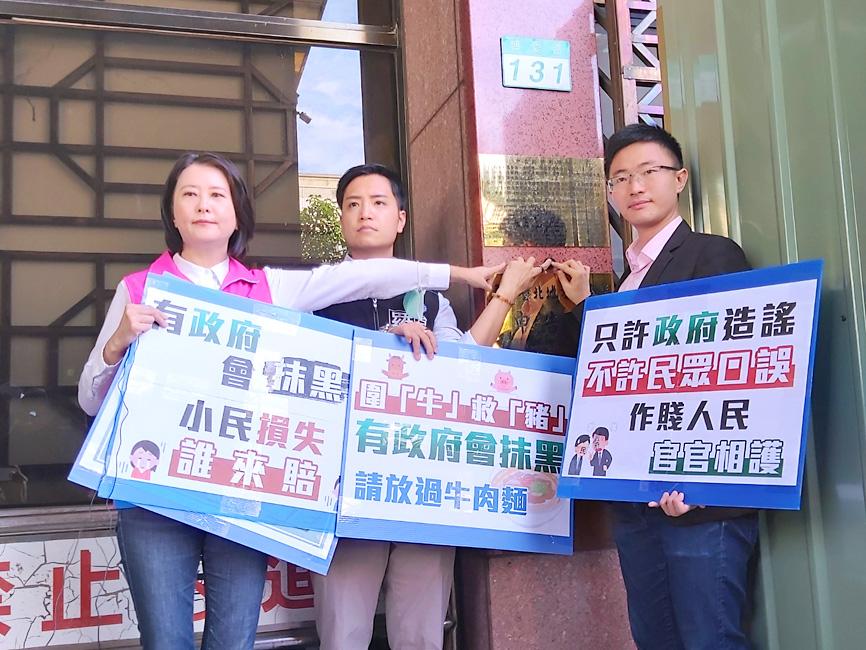Ting Yi-ming (丁怡銘) has resigned as Executive Yuan spokesman after wrongly claiming that an award-winning beef noodle soup restaurant serves meat that contains ractopamine.
Premier Su Tseng-chang (蘇貞昌) late on Sunday approved Ting’s resignation with immediate effect, Executive Yuan Secretary-General Li Meng-yen (李孟諺) said yesterday.
Li has been assigned by Su to temporarily fill Ting’s post.

Photo: Chen Wei-tzu, Taipei Times
Ting said that he resigned to take responsibility for trouble caused by his comments last week.
Ting, at a news conference held following the Executive Yuan’s weekly meeting on Thursday, said that the winner in this year’s Taipei International Beef Noodle Festival uses imported US beef containing the leanness enhancer.
The restaurant quickly responded by posting on Facebook a copy of its SGS certification showing that no ractopamine residue was found in its beef.
Ting subsequently walked back the comments, apologized to the restaurant “for any trouble caused” and reiterated that any imported beef which meets Codex Alimentarius Commission standards is safe for consumption.
The statement was condemned by the Chinese Nationalist Party (KMT), which accused Ting of spreading false information as a government spokesman and called on him to resign.
Separately yesterday, KMT Taipei City Councilor Wang Hung-wei (王鴻薇), New Party Taipei City Councilor Ho Han-ting (侯漢廷) and KMT Taichung City Councilor Lo Ting-wei (羅廷瑋) filed charges against Ting at the Taipei District Prosecutors’ Office, accusing him of breaching the Act Governing Food Safety and Sanitation (食品安全衛生管理法), which states that people who intentionally spread false information about food safety issues that incurs damage to the public or another person face a maximum prison term of three years or a fine of NT$1 million (US$34,710).

Taiwan has received more than US$70 million in royalties as of the end of last year from developing the F-16V jet as countries worldwide purchase or upgrade to this popular model, government and military officials said on Saturday. Taiwan funded the development of the F-16V jet and ended up the sole investor as other countries withdrew from the program. Now the F-16V is increasingly popular and countries must pay Taiwan a percentage in royalties when they purchase new F-16V aircraft or upgrade older F-16 models. The next five years are expected to be the peak for these royalties, with Taiwan potentially earning

POSITIVE DEVELOPMENT: Japan and the US are expected to hold in-depth discussions on Taiwan-related issues during the meeting next month, Japanese sources said The holding of a Japan-US leaders’ meeting ahead of US President Donald Trump’s visit to China is positive news for Taiwan, former Japan-Taiwan Exchange Association representative Hiroyasu Izumi said yesterday. After the Liberal Democratic Party’s landslide victory in Japan’s House of Representatives election, Japanese Prime Minister Sanae Takaichi is scheduled to visit the US next month, where she is to meet with Trump ahead of the US president’s planned visit to China from March 31 to April 2 for a meeting with Chinese President Xi Jinping (習近平). Japan and the US are expected to hold in-depth discussions on Taiwan-related issues during the

‘LIKE-MINDED PARTNER’: Tako van Popta said it would be inappropriate to delay signing the deal with Taiwan because of China, adding he would promote the issue Canadian senators have stressed Taiwan’s importance for international trade and expressed enthusiasm for ensuring the Taiwan-Canada trade cooperation framework agreement is implemented this year. Representative to Canada Harry Tseng (曾厚仁) in an interview with the Central News Agency (CNA) said he was increasingly uneasy about Ottawa’s delays in signing the agreement, especially as Ottawa has warmed toward Beijing. There are “no negotiations left. Not only [is it] initialed, we have three versions of the text ready: English, French and Mandarin,” Tseng said. “That tells you how close we are to the final signature.” Tseng said that he hoped Canadian Prime Minister Mark Carney

STAY IN YOUR LANE: As the US and Israel attack Iran, the ministry has warned China not to overstep by including Taiwanese citizens in its evacuation orders The Ministry of Foreign Affairs (MOFA) yesterday rebuked a statement by China’s embassy in Israel that it would evacuate Taiwanese holders of Chinese travel documents from Israel amid the latter’s escalating conflict with Iran. Tensions have risen across the Middle East in the wake of US and Israeli airstrikes on Iran beginning Saturday. China subsequently issued an evacuation notice for its citizens. In a news release, the Chinese embassy in Israel said holders of “Taiwan compatriot permits (台胞證)” issued to Taiwanese nationals by Chinese authorities for travel to China — could register for evacuation to Egypt. In Taipei, the ministry yesterday said Taiwan